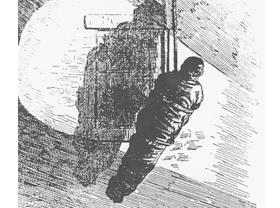Ladies' Garment Worker, April 1911.
When ready to go to press we learn of the awful calamity at the Triangle Waist Company. While most of the garment manufacturing establishments in New York City are not any better as far as fire protection is concerned, it is significant that the worst calamity happened at the Triangle, known among the workpeople in the trade as the "prison." The name is probably due the extraordinary discipline with poor earning for which the firm is famous.
It is not strange that in this most democratic of all countries in the world the employers can so easily use the arm of the law to protect themselves against any inconveniences which their workpeople may cause them, but the law is nowhere when the life and limb of the worker is to be protected.
The writer of these lines, when approaching the factory some two years ago in an attempt to organize the workpeople of that firm, was pounced upon by two plainclothed policemen and taken to the police cell. No one, however, knows whom to blame for this calamity.
It is evident that the worker can expect next to nothing in the way of protection from the legal authorities. Whether it is the Supreme Court or the good people who are interested in the architectural beauties of the city, nothing will be done until the workers will begin in earnest to attend to their own business. They must declare a strike at all such fire traps until adequate protection is provided.
Pickets should be posted at the entrance of such places with sign boards bearing the following inscription: Please do not go to work in this place until proper fire protection is provided for the workpeople.
Let the authorities find our action contrary to the Sherman Anti-Trust Laws or any other of the innumerable laws provide to safeguard the interest of the capitalists, and which the authorities are ever ready to guard jealousy. We will cheerfully go to prison but there will be no more fire traps. Such a strike will put an end to such a state of things within 48 hours.
There are in the same building a number of cloak shops, who before the general strike, worked until 6 o'clock on Saturdays. Thanks to the change in hours all these left at 1 o'clock, otherwise the victims would have been more numerous.

